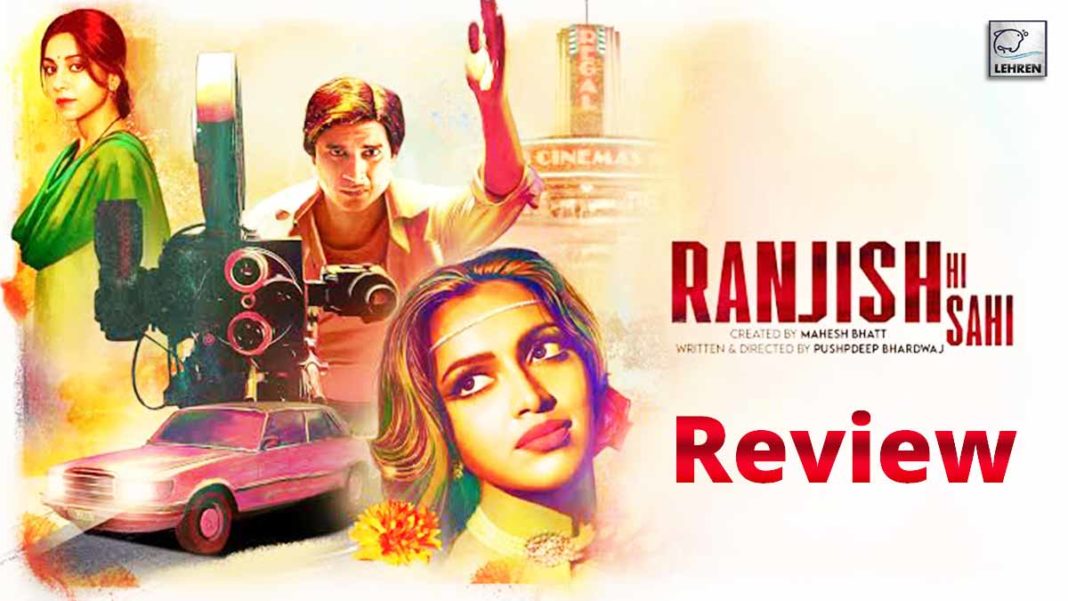To the dear Bhatt Parivar of Mahesh, Mukesh, Vishesh, and Sakshi, plus their kith and kin since a few other names like Kumkum Saigal are a part of the credits. How long are you going to keep mining Mahesh Bhatt’s weepy story of the illegitimate kid, the mother who’s a closet Muslim and the unhinged other women?
It’s been 40 full years since Arth (1982), the semi-autobiographical with which Mahesh Bhatt hit a commercial goldmine. Since then, the Bhatt camp, which includes Mohit Suri and Vikram Bhatt, has been milking dry the same premise of the Muslim mother and the absentee father who has another family, or the married man and the schizophrenic actress-girlfriend. In the past, they have recycled and repackaged the Bhatt family story as Zakhm (a 1998 National Award winner), Woh Lamhe (2006), and Ankahee (2006).
In 2022, the platform has changed but the content remains tiresomely constant. ‘Created by Mahesh Bhatt’ should read, ‘Re-re-created by Mahesh Bhatt’s Ranjish Hi Sahi is yet another tedious retelling of the autobiographical story.
It gets worse with each re-telling and this 8-episode series scrapes the bottom.
In an ode to Amar Akbar Anthony, a huge hoarding of Ajay Anwar Albert starring Aamna Parvez stands as the symbol of Hindi cinema of the 70s.
ALSO READ – Yeh Kaali Kaali Aankhein Review: Killings By The Kilo
Substitute Aamna with Parveen Babi, Shankar with Mahesh Bhatt, Ganesh with brother Mukesh and Anju with Mahesh’s first wife Kiran, and you don’t have to watch this labored justification of the struggling filmmaker who got involved with a famous actress.
It’s not just the overtold and oversold autobiography. There’s a bland prosaicness everywhere. Tahir Raj Bhasin (filmmaker Shankar) who sparkled as the kingpin of a human trafficking racket in Mardaani, walks through the show looking helpless, using one flat monotone. Amala Paul as moody, unpredictable, and seriously ill Aamna valiantly attempts to pull off the mentally and emotionally fragile actress. Amrita Puri as wife Anju and Zarina Wahab as the Muslim mother (a point that’s harped on and on) bring some energy to their scenes.
But the telling which keeps going from one confusing flashback to another so that time periods take a while to understand is so lethargic that trying to paint the filmmaker as a good loyal man caught in a situation is almost apologetic.
Laughably, there’s an attempt to sound intellectual and philosophical with the inexplicable character of ‘Watchman’ (Uday Chandra) thrown in where ‘time’ and ‘watch’ are linked. So clever.
Another ‘clever’ addition are tapes by the ‘Play Misty’ kind of obsessive actress where Aamna pours her heart out to Shankar. It leads to an overdoing of voiceovers, like the writing couldn’t think of an interesting way to go about the narration.
‘Mary’ is pronounced as ‘Marry’ and there are cliches like ‘hollow rules of society’ as the story of the filmmaker who ends up in the same situation as the father he always despised, unfolds listlessly.
Easily choppable are chunks like two of Shankar’s drunken scenes (with brother Ganesh on the beach and another with ‘Watchman’), another of the mother in a burqa taking Shankar to a dargah and watching him pray with her community with untold happiness in her eyes, followed by a long scene on the beach and much empty philosophy from the mother. Why the mother took only Shankar and not his brother Ganesh too, on this discover-your-roots trip, beats me.
The Shiv bhakt credentials of a boorish producer named Jagmohan (Saurabh Sachdeva) who makes his wife sit on the floor, are carefully established.
ALSO READ – Human Review: Shefali Shah & Kirti Kulhari’s Web Series Is Well Shot And Well Narrated
But writer-director Pushdeep Bhardwaj needs to examine his own idea of a good wife. Consider two sequences that feature Shankar’s wife Anju. When there’s no money in the house, she can’t even give her daughter a glass of milk, Anju has a legitimate outburst. But the next day, while the one-expression husband stands doing nothing, it’s she who apologises and offers him chai.
There’s another where Anju, who has got herself a job, serves the entire family that’s watching television and then sits at the end all by herself to eat. It speaks much for Bhardwaj’s concept of the wife’s role in a family.
There’s much repetition of thought too, like Anju repeating, “I’ve lived with you for so many years but I can’t understand you.” We don’t get it either.
PS: The only redeemable part is the title Ranjish Hi Sahi, the Ahmed Faraz ghazal made famous by Mehdi Hassan.

